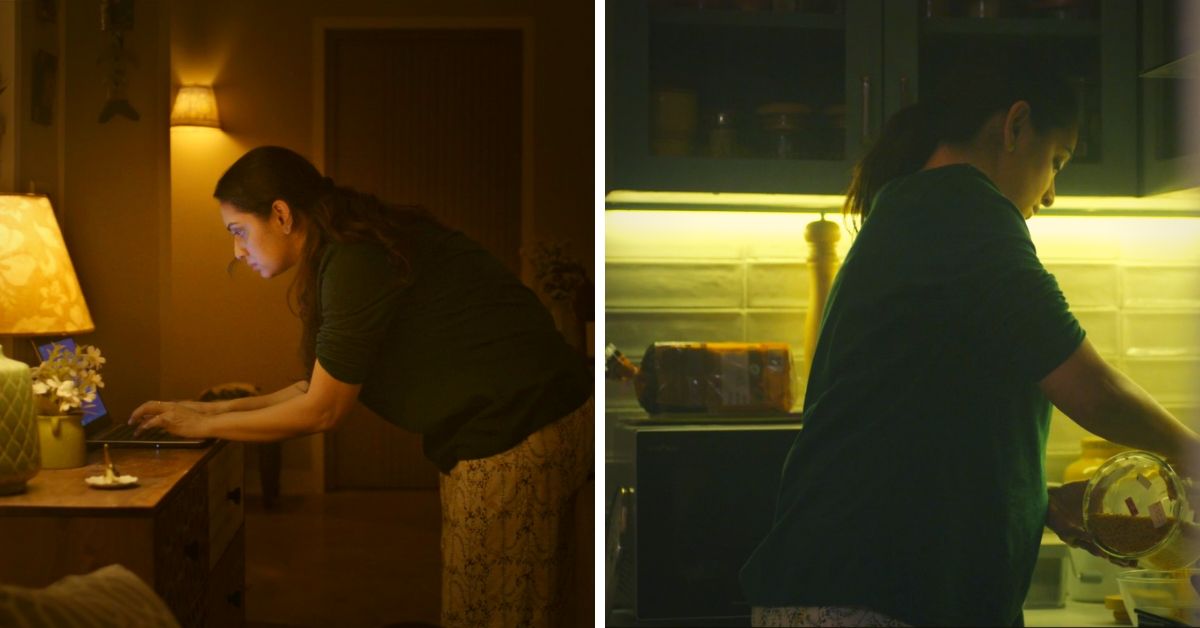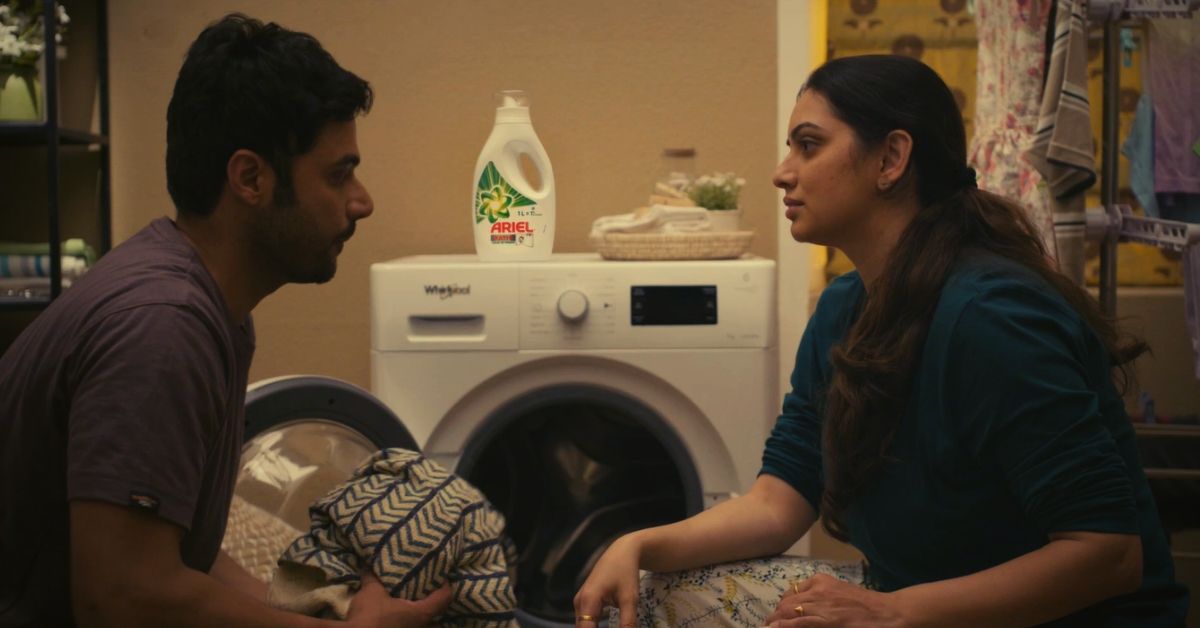What Happens To Women In Our Homes When Men Don’t #ShareTheLoad
Did you know that 71 per cent of women in India sleep less than their husbands due to household chores? Here's how you can change it. #ShareTheLoad

This article has been sponsored by Ariel
When was the last time you went to sleep without worrying about the next day’s meal or the unending list of chores you need to complete? This is a question I often ask my mother when on a call with her. And the answer always starts with a soft sigh followed by a change of topic.
A harder nudge only lets out an age-old lesson taught by generations of mothers to their daughters – ‘The family depends on us. So, we women always have to balance the scales of work outside and at home. You will understand when you grow up.’
Well, I have grown up and I still don’t understand why she or I would have to get up before everyone and sleep last. The house is not just our responsibility.

24-year-old Anoushka Jain, a daughter who had to move out of her home in Delhi for a job, shares her observations on the matter- “Growing up, my sister and I were quite aware that our mother would remain ill on most days because of her migraine. So it only natural to help her out. My father, despite having limited knowledge of cooking, started taking charge of the household chores. From getting us ready for school to cooking food, making sure everyone is fed, he did it all. We all had assigned chores from bedding, dusting the house, drying the clothes, folding them in the evening and helping with the kitchen. It was only later that I had the shocking realisation that most households did not run like that.
“If each individual in the family does their basic part, and looks after themselves, women too will have better lives. One of the most infuriating scenarios of Indian society that I have observed in most households is that men are not even taught to keep their unclean dishes in the sink.
Change indeed begins at home and one step towards that is to involve the entire household in chores and treat house work like everyone’s responsibility. This is the wave of change Ariel is trying to bring through its #ShareTheLoad movement and curb gender inequality starting from home.
A mirror to society, Ariel has been raising important questions since 2015 to bring to light the importance of sharing workload at home.
From talking about distribution of domestic chores because laundry is not only a woman’s job, to the ‘Dads Share The Load’ movement in 2016 that shattered prejudice around household chores — the overall movement has been asking pertinent questions for social change.
This year, Chapter 4 of the #ShareTheLoad campaign looks a little deeper into the problem, taking the conversation around a harsh reality which manifests due to unequal distribution of work at home. 71 percent women in India sleep less than their husbands due to household chores, suggests a survey by Toluna. And caught in this race of balancing work outside and at home while providing only the best for their families, they compromise on rest and most importantly, personal time.

A husband and a young father, 32-year-old Rickson Mathew adds to the conversation, “I grew up in a family full of women, with my mother, grandmother and a sister. So things around me were always magically sorted out. My morning breakfast would be ready, school uniform would be ironed and hung near the cupboard, bags packed, shoes polished and so on. Even when in college, I somehow never felt the need to do anything.”
“Things changed when I moved out. I was hit with the hard reality of doing things on my own. A few years later, post my marriage, I began to notice how my wife would juggle with her office work and home. That realization brought back all the instances where the women in my family strived to provide for us, while also managing work outside. I have a son now and I am trying to break that cycle. My wife and I have created a chores duty-list that divides the work between all of us, including my 10-year-old,” shares Rickson, a Bengaluru resident.
Trapped in the gender constraints, this practice of keeping men away from household chores acts as a deterrent for women in many ways.
“It is a life skill if not a survival skill. All these things which my mother made me learn during my childhood have become a way of life for me. I have been away from my family since high-school, during this time becoming self-reliant came to me easier than so many of my friends and I think this is the result of all that helping I did in the past,” says Omkar Pathradhar (26), a Pune-resident who is on the pursuit of self-reliance.
“Sharing the workload at home is important because we all should be able to take care of ourselves and the people we care about. The hours and the energy that goes in housework is as important as in any other officially categorised ‘work’. I have had to shift to a hostel for some time and the sheer significance of “home food” that I had taken for granted all these years has turned out to be a true awakening for me,” adds Soumya Johri, 24, a research Scholar, Women and Gender Studies at Ambedkar University Delhi.

It is this idea of sharing the workload that Ariel believes in. As a brand, Ariel has been raising the right questions over the years through various campaigns and has become the facilitator of change in many Indian households. With #ShareTheLoad as their central message, Ariel has been curbing inequality within households, while drawing attention to the uneven distribution of domestic chores.
And this time, they are back with information on the impact of unequal distribution. While Ariel has seen change over the years, there is still a long way to go. According to their survey, 79 per cent men thought laundry is only a woman’s job in 2014. This number went down to 41 per cent in 2019. With significant influence on the thought process, Ariel has now taken the onus to drive action. This is because even though men have started to increase their involvement in domestic chores, the women still takes the responsibility of getting everything done. This means that the mental load is still for women to take up. Thus, Ariel aims to make laundry the face of this movement against inequality within households by urging men to take the first step to #ShareTheLaundry and eventually, #ShareTheLoad for #EqualSleep.
So, let’s get together, start the conversation, extend a helping hand and set the right examples for society at large.
Like this story? Or have something to share?
Write to us: [email protected]
Connect with us on Facebook and Twitter

Similar Story

Sudha Murthy: How a Small Town Girl Shattered the Glass Ceiling With Her Self-Belief
As an engineer, Sudha Murthy wrote a letter to JRD Tata that changed TELCO’s employment policy. Little did she know then that she would make history, and become an icon for millions of Indians.
Read more >
If you found our stories insightful, informative, or even just enjoyable, we invite you to consider making a voluntary payment to support the work we do at The Better India. Your contribution helps us continue producing quality content that educates, inspires, and drives positive change.
Choose one of the payment options below for your contribution-
By paying for the stories you value, you directly contribute to sustaining our efforts focused on making a difference in the world. Together, let's ensure that impactful stories continue to be told and shared, enriching lives and communities alike.
Thank you for your support. Here are some frequently asked questions you might find helpful to know why you are contributing?


This story made me
-
97
-
121
-
89
-
167












